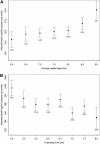Short sleep duration is associated with reduced leptin, elevated ghrelin, and increased body mass index
- PMID: 15602591
- PMCID: PMC535701
- DOI: 10.1371/journal.pmed.0010062
Short sleep duration is associated with reduced leptin, elevated ghrelin, and increased body mass index
Abstract
Background: Sleep duration may be an important regulator of body weight and metabolism. An association between short habitual sleep time and increased body mass index (BMI) has been reported in large population samples. The potential role of metabolic hormones in this association is unknown.
Methods and findings: Study participants were 1,024 volunteers from the Wisconsin Sleep Cohort Study, a population-based longitudinal study of sleep disorders. Participants underwent nocturnal polysomnography and reported on their sleep habits through questionnaires and sleep diaries. Following polysomnography, morning, fasted blood samples were evaluated for serum leptin and ghrelin (two key opposing hormones in appetite regulation), adiponectin, insulin, glucose, and lipid profile. Relationships among these measures, BMI, and sleep duration (habitual and immediately prior to blood sampling) were examined using multiple variable regressions with control for confounding factors. A U-shaped curvilinear association between sleep duration and BMI was observed. In persons sleeping less than 8 h (74.4% of the sample), increased BMI was proportional to decreased sleep. Short sleep was associated with low leptin (p for slope = 0.01), with a predicted 15.5% lower leptin for habitual sleep of 5 h versus 8 h, and high ghrelin (p for slope = 0.008), with a predicted 14.9% higher ghrelin for nocturnal (polysomnographic) sleep of 5 h versus 8 h, independent of BMI.
Conclusion: Participants with short sleep had reduced leptin and elevated ghrelin. These differences in leptin and ghrelin are likely to increase appetite, possibly explaining the increased BMI observed with short sleep duration. In Western societies, where chronic sleep restriction is common and food is widely available, changes in appetite regulatory hormones with sleep curtailment may contribute to obesity.
Conflict of interest statement
Figures



References
-
- Locard E, Mamelle N, Billette A, Miginiac M, Munoz F, et al. Risk factors of obesity in a five year old population. Parental versus environmental factors. Int J Obes Relat Metab Disord. 1992;16:721–729. - PubMed
-
- Kripke DF, Garfinkel L, Wingard DL, Klauber MR, Marler MR. Mortality associated with sleep duration and insomnia. Arch Gen Psychiatry. 2002;59:131–136. - PubMed
-
- Vioque J, Torres A, Quiles J. Time spent watching television, sleep duration and obesity in adults living in Valencia, Spain. Int J Obes Relat Metab Disord. 2000;24:1683–1688. - PubMed
-
- von Kries R, Toschke AM, Wurmser H, Sauerwald T, Koletzko B. Reduced risk for overweight and obesity in 5- and 6-y-old children by duration of sleep—A cross-sectional study. Int J Obes Relat Metab Disord. 2002;26:710–716. - PubMed
-
- Gupta NK, Mueller WH, Chan W, Meininger JC. Is obesity associated with poor sleep quality in adolescents? Am J Human Biol. 2002;14:762–768. - PubMed
Publication types
MeSH terms
Substances
Grants and funding
LinkOut - more resources
Full Text Sources
Other Literature Sources
Medical
Miscellaneous

